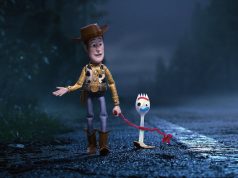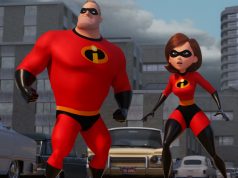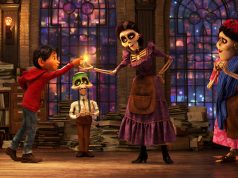“Cars” is the longest Pixar movie so far, probably the least engaging, and certainly the least funny. And yet somehow it’s still better than two-thirds of the movies I’ve seen this year. Some of the Pixar magic may have been misdirected on this project, but these guys probably couldn’t make a bad movie if they wanted to. I’m surprised they can even make a so-so one.
The film is set in a world where there are no humans or animals, only automobiles. At the nation’s NASCAR-style arenas, thousands of cars gather to cheer as others of their species strut their stuff — the equivalent of humans going to a track-and-field competition, I suppose. Cars named Bob Cutlass and Darrell Cartrip (voiced by Bob Costas and Darrell Waltrip, of course) give the play-by-play.
Among the top racers is Lightning McQueen (Owen Wilson), a cocky newcomer who downplays his pit crew’s contributions and loves nothing more than being photographed by the press. Overdue for a life lesson, natch, he gets stranded in the Route 66 desert town of Radiator Springs while on his way to a major race in California. He tears up the tiny town’s only road in his recklessness and is ordered by the local judge, Doc Hudson (Paul Newman), to repair it before he can leave.
Ah, the city slicker stuck in a small town who comes to love the locals and re-examine his selfish ways: If there’s a more time-honored premise, I can’t think of it. I’d like to say it gets a fresh Pixarian twist, but it really doesn’t. Lightning falls for a local Porsche named Sally (Bonnie Hunt), befriends a dumb tow truck (Larry the Cable Guy), and eventually sets out to help the dying, off-the-interstate town revitalize itself.
The usual Pixar whimsy is in the details. A sleazy out-of-town restaurant advertises “convertible waitresses.” Instead of bugs crawling around, they have tiny VW Bugs with wings. Lightning is embarrassed that his major racing sponsor is Rusteze Medicated Bumper Ointment — hemorrhoid cream, in other words. The film’s depiction of his rusty, backwoods fans is particularly amusing. (Also: You MUST stay through the closing credits.)
So what’s the problem? It’s hard to feel affection for the characters. They’re machines. Pixar films have often attributed human qualities to non-human things — fish, monsters, bugs, toys — but at least they were biological creatures (or, in the case of “Toy Story,” playthings in the shape of biological creatures). Cars are just cars. Even with eyes on their windshields and front grilles that look like mouths, and despite having personalities and ambitions and quirks, they’re still just machines.
I wonder if it was a mistake to create a world so far removed from reality. Notice how the previous Pixar movies have involved humans, tangentially if not directly. “Finding Nemo” and “Monsters Inc.” were actually ABOUT their characters’ interactions with people, and of course the heroes of “The Incredibles” were actual humans. But in “Cars,” people don’t even exist. Everything is mechanical, even the “animals.” (In rural towns, instead of cow-tipping, the kids go tractor-tipping.) It’s imaginative, but it creates an emotional chasm: Even the craziest sci-fi movies with the most whacked-out ideas usually have, if not actual Earthlings, beings who could be mistaken for Earthlings.
The film is also very devoted to its nostalgia for old cars and the cachet of Route 66, sentiments that much of the audience won’t share. (The question, “How many times can one movie feature the song ‘Route 66’?” becomes relevant, too.) Making unusual, specific situations feel universal has been Pixar’s strength — remember how you cried in “Toy Story 2” when Sarah MacLachlan sang about a toy’s sadness at being discarded by her owner? — but the plight of Radiator Springs and Lightning McQueen’s personal journey never really hit home.
I find myself liking the film, and admiring much of it — the animation technology becomes more stunning every year — but not loving it. John Lasseter, Pixar’s top guy and the director of the “Toy Storys” and “A Bug’s Life,” is at the helm, and the writers are qualified. I don’t know what happened to prevent “Cars” from being an instant classic like its predecessors were.
Yep, here I am, complaining that a movie is merely “good” instead of “mind-blowingly awesome.” But hey, Pixar set the bar. Maybe they should take Dreamworks’ cue and make a few lousy movies now and then, just to make the good ones seem better.
B- (1 hr., 51 min.; )





